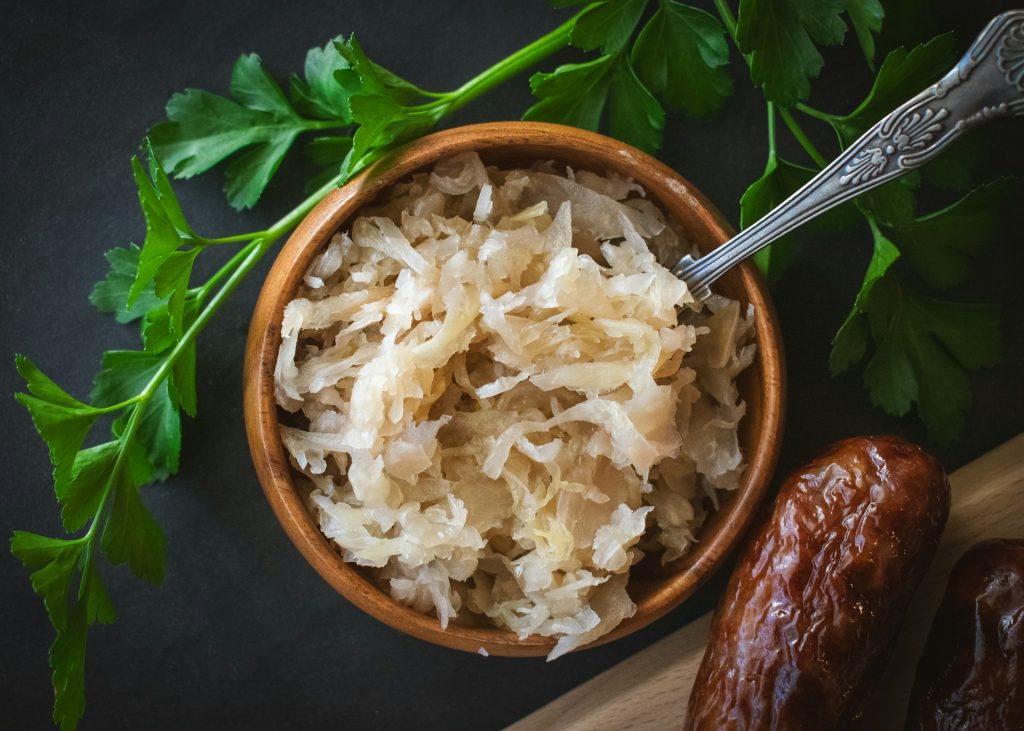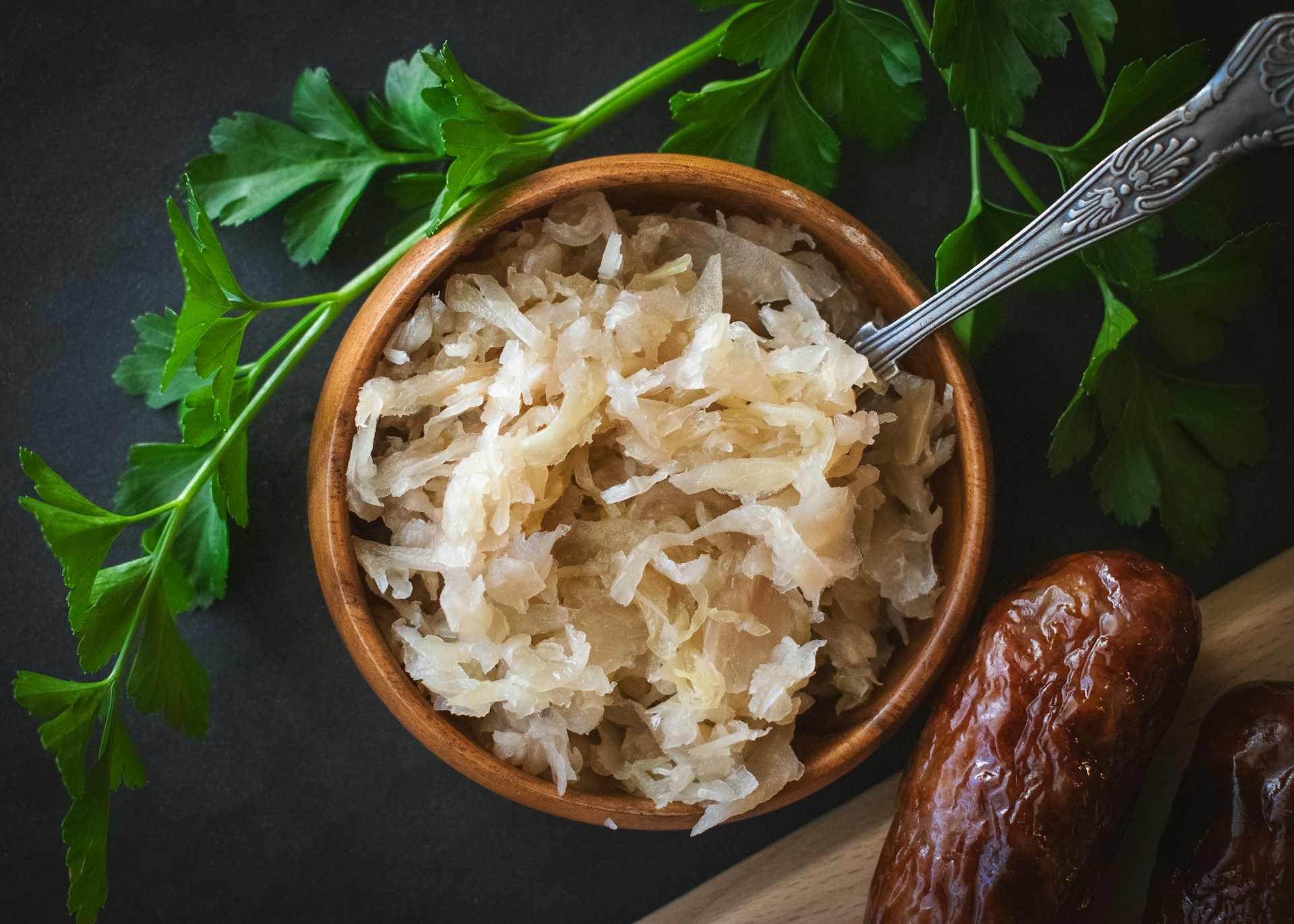In recent years, fermented foods have made a comeback, and for good reason. These traditional foods, rich in probiotics, are celebrated for their potential health benefits, especially for gut health. If you’re curious about how fermented foods can enhance your well-being, this guide will delve into their benefits and offer simple ways to incorporate them into your diet.

What Are Fermented Foods?
Fermented foods are those that have undergone a natural process where microorganisms like bacteria or yeasts break down food components, such as sugars, into simpler substances. This process not only preserves the food but also enriches it with beneficial compounds.
Common examples of fermented foods include:
- Yogurt: Made from fermented milk.
- Kimchi: A spicy Korean dish made from fermented vegetables.
- Sauerkraut: Fermented cabbage with a tangy flavor.
- Kombucha: A fermented tea beverage.
- Miso: A fermented soybean paste used in soups and sauces.
The Science Behind Fermentation
Fermentation is a biological process that creates probiotics, or “good bacteria,” which are vital for a healthy gut microbiome. These probiotics help maintain a balanced environment in the gut by promoting the growth of beneficial bacteria while inhibiting harmful ones.
Health Benefits of Fermented Foods
Here’s how incorporating fermented foods into your diet can positively impact your health:
Improved Digestive Health
Probiotics from fermented foods support a healthy balance of gut bacteria, which can alleviate symptoms of digestive issues such as IBS (Irritable Bowel Syndrome), constipation, and diarrhea. By promoting the growth of beneficial bacteria, fermented foods can improve overall digestive function and comfort.
Enhanced Nutrient Absorption
Fermentation increases the bioavailability of certain nutrients, making them easier for your body to absorb. For instance, fermented foods can enhance the absorption of vitamins like B12 and minerals such as iron. This means that you get more nutritional benefit from the foods you eat.
Boosted Immune System
A healthy gut is closely linked to a strong immune system. By supporting gut health, fermented foods can help your body fend off infections and maintain a robust immune response. Probiotics play a role in regulating the immune system and reducing inflammation.

Mental Health Benefits
Recent research suggests a strong connection between gut health and mental well-being, known as the gut-brain axis. A balanced gut microbiome can positively influence mood and cognitive function, potentially reducing symptoms of anxiety and depression.
Incorporating Fermented Foods into Your Diet
Adding fermented foods to your diet can be both simple and enjoyable. Here are a few easy ways to get started:
Easy Ways to Add Fermented Foods
- Yogurt: Enjoy it as a snack or breakfast with fresh fruit and a drizzle of honey.
- Kimchi: Add it to sandwiches, salads, or as a side dish for an extra kick.
- Sauerkraut: Top your hot dogs, burgers, or sandwiches with a generous serving.
- Kombucha: Sip it as a refreshing beverage or mix it into smoothies.

Making Your Own Fermented Foods
Making fermented foods at home can be rewarding and cost-effective. Here are two simple recipes to try:
1. Homemade Sauerkraut
Ingredients:
- 1 medium cabbage, shredded
- 1 tablespoon salt
- 1 tablespoon caraway seeds (optional)
Instructions:
- In a large bowl, mix the shredded cabbage with salt and caraway seeds.
- Massage and squeeze the cabbage with your hands to release its juices.
- Pack the cabbage tightly into a clean jar, pressing it down to eliminate air pockets.
- Cover the jar with a lid and leave it at room temperature for 3-7 days, tasting it daily until it reaches your desired sourness.
- Once fermented, store the sauerkraut in the refrigerator.
2. Easy Kimchi
Ingredients:
- 1 medium Napa cabbage, cut into chunks
- 1/4 cup sea salt
- 2-3 radishes, sliced
- 2-3 green onions, chopped
- 3 cloves garlic, minced
- 1 tablespoon ginger, minced
- 2 tablespoons Korean red pepper flakes (gochugaru)
- 1 tablespoon fish sauce (optional)
Instructions:
- Toss the cabbage with salt in a large bowl and let it sit for 1-2 hours.
- Rinse the cabbage thoroughly and drain well.
- Mix the radishes, green onions, garlic, ginger, red pepper flakes, and fish sauce in a bowl.
- Combine the cabbage with the spice mixture and pack it into a clean jar.
- Press down firmly to release air bubbles and cover the jar with a lid.
- Leave the jar at room temperature for 1-5 days, tasting daily until it reaches your preferred level of fermentation.
- Store kimchi in the refrigerator.
Considerations and Precautions
While fermented foods offer numerous benefits, some individuals, particularly those with specific health conditions, may need to approach them cautiously. It’s essential to choose high-quality, unpasteurized products to ensure you receive the full probiotic benefits. Always consult with a healthcare provider if you have concerns about incorporating fermented foods into your diet.
Conclusion
Incorporating fermented foods into your diet can significantly benefit your gut health and overall well-being. With their rich probiotic content, enhanced nutrient absorption, and positive effects on digestion, immune function, and mental health, fermented foods are a valuable addition to any balanced diet.
Ready to start enjoying the benefits of fermented foods? Subscribe to our newsletter for more tips on nutrition, wellness, and easy recipes to boost your health.



